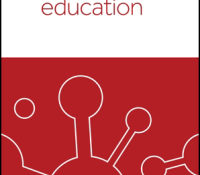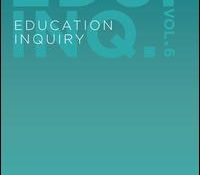tandfonline.com har udgivet en rapport under søgningen “Teacher Education Mathematics”: ABSTRACT Formulae display:?Mathematical formulae have been encoded as MathML and are displayed in this HTML version using MathJax in order to improve their display. Uncheck the box to turn MathJax off. This feature requires Javascript. Click on a formula to zoom. ABSTRACT School leaders are assumed to be important for the implementation of data-based decision making (DBDM), but little is known about changes in leadership during this implementation. Educational leadership was measured before, during, and after a two-year, school-wide DBDM intervention in 96 primary schools. Advanced analysis techniques were applied: educational leadership was classified based on multilevel latent class analysis, changes were modeled using multi-state modeling. Results indicate that leadership was stable (44%) or improved (40%) during DBDM implementation. Stability… Continue Reading →
Like this:
Like Loading...
tandfonline.com har udgivet en rapport under søgningen “Teacher Education Mathematics”: ABSTRACT ABSTRACT Children in foster care may face difficulties during their school years. When it comes to academic achievement, there is reported low school performance and lower grades. However, school may be strong protective factor in difficulties if supports are individual. School-based interventions represent a possibility for supporting children whose home life may make them vulnerable. This discussion paper presents Finnish initiative, which is based on Skolfam® model used in several Nordic countries. Link til kilde
Like this:
Like Loading...

tandfonline.com har udgivet en rapport under søgningen “Teacher Education Mathematics”: Abstract Abstract In third grade the focus on math word problems becomes prominent. In the limited third grade research, teacher-mediated explicit instruction with multiple exemplars, teaching students to use visual representations, and the incorporation of self-strategies, have proven effective. For these practices to reach their full potential though, their content must be relevant and provide for growth to mature mathematical concepts. Based on these conclusions, additional research was needed. Therefore, the focus of this study was to evaluate the effectiveness of a multi-component word problem-solving intervention with explicit instruction strategies, multiple exemplars, the teaching of student-generated visual representations, incorporation of a self-monitoring checklist, and Common Core State Standards’ appropriate curriculum. Within a multiple baseline across behaviors design, the study evaluated… Continue Reading →
Like this:
Like Loading...
eric.ed.gov har udgivet: The purpose of this study was to examine how elementary pre-service teachers’ transferred mathematics instructional practices learned in a methods course at the university to a field-based classroom setting using response to intervention (RTI) methodology. Pre-service teachers (PSTs) implemented a required Mathematics Interaction Project with small groups of elementary students in the field. The project consisted of initiating a screening instrument on a targeted math skill, providing four to six intervention lessons, and then tracking student progress using formative and summative assessment measures. Data were generated through document analysis of the MIP reflection submissions and focus group interviews with 22 participants. Findings indicate that most PSTs’ transferred mathematics instructional practices such as manipulative use, lesson planning, and assessment to the field-based setting. However, only candidates with a… Continue Reading →
Like this:
Like Loading...
eric.ed.gov har udgivet: Third grade students at a Midwestern elementary school participated in a 9-week mobile learning intervention (MLI). Two classrooms used Everyday Math and daily practice using flashcards, etc., to learn multiplication. Two other classrooms used Everyday Math and web applications for the iPod touch for daily practice. MLI students outperformed comparison students on a postintervention multiplication test controlling for several covariates, including prior achievement, home iPod touch use, and previous teacher, among others. The medium-sized performance advantage (b = 0.217) was statistically significant at the 0.01 alpha level. The MLI influence on the most difficult multiplication items was also statistically significant but less important than the student’s demographic profile and the teacher’s advanced educational technology degree. Experimental research is needed to assess longer-term achievement effects for diverse student… Continue Reading →
Like this:
Like Loading...
eric.ed.gov har udgivet: “Accelerated Math”[TM], published by Renaissance Learning, is a software tool used to customize assignments and monitor progress in mathematics for students in grades 1-12. “Accelerated Math”[TM] creates individualized assignments that align with state standards and national guidelines, scores student work, and generates formative feedback through reports for teachers and students. The software can be used in conjunction with the existing math curriculum to add practice components and aid teachers in differentiating instruction via the program’s progress-monitoring data. The What Works Clearinghouse (WWC) reviewed 32 studies on “Accelerated Math”[TM]. One of these studies meets WWC evidence standards; two studies meet WWC evidence standards with reservations; the remaining 29 studies do not meet either WWC evidence standards or eligibility screens. Based on the three studies, the WWC found mixed… Continue Reading →
Like this:
Like Loading...
eric.ed.gov har udgivet: The low level of mathematics performance of U.S. students in relation to national standards and in international comparisons has concerned educators and policy makers for many years. The authors’ primary goals were to design a feasible and usable intervention and gather data on the promise of the intervention to foster students’ conceptual understanding of whole number concepts and skills and procedural fluency. The FUSION curriculum was developed using an iterative design process aligned with design experiment methodology. The pilot study took place in nine schools in two suburban school districts in the northwest. The FUSION program is a Grade 1 (Tier 2) mathematics intervention that focuses specifically on building students’ early knowledge of whole number concepts. Results indicate that understanding student outcomes, program implementation fidelity, and interventionists’… Continue Reading →
Like this:
Like Loading...
tandfonline.com har udgivet en rapport under søgningen “Teacher Education Mathematics”: ABSTRACT ABSTRACT In this study we used an assessment tool evaluated in a previous study to identify students who were at-risk of not being successful in our introductory statistics course. We then required these students to attend peer tutoring, early in the semester, as an intervention. While we saw a significant increase in student success for all students in this study compared with the previous study, the at-risk students who completed the required tutoring had a significantly higher increase in success than their peers. Link til kilde
Like this:
Like Loading...
eric.ed.gov har udgivet: “Saxon Math” is a textbook series covering grades K-12 based on incremental development and continual review of mathematical concepts to give students time to learn and practice concepts throughout the year. The series is aligned with standards of the National Council of Teachers of Mathematics (NCTM) and various states, and can be adapted for special education students in inclusion classrooms, pullout programs, or self-contained resource classrooms. Although content differs by course, the incremental, distributed approach of “Saxon Math” is the same, with mathematical concepts presented in a series of short “lessons” intended to gradually build understanding and previously-taught concepts practiced and assessed throughout the course. Developed in the early 1980s, “Saxon Math” included four middle school math textbooks used in the studies included in this intervention report.… Continue Reading →
Like this:
Like Loading...
eric.ed.gov har udgivet: Success in primary and secondary school mathematics is becoming increasingly important to today’s teachers, students, parents and employment providers in Australia. Mathematics is viewed as high status and essential for a range of employment opportunities. The Disability Standards for Education [1] and the Australian Curriculum, Reporting and Assessment Authority [2] underscore the rights of students with disability to access the curriculum on the same basis as students without disability. They are entitled to rigorous, relevant and engaging learning opportunities drawn from Australian Curriculum content on the same basis as students without disability. Taking this context into account, this paper provides a work-in-progress report about a two year mathematics intervention project conducted in twelve special schools (Preparatory to Year 12) in Queensland, Australia. The purpose of the project… Continue Reading →
Like this:
Like Loading...



